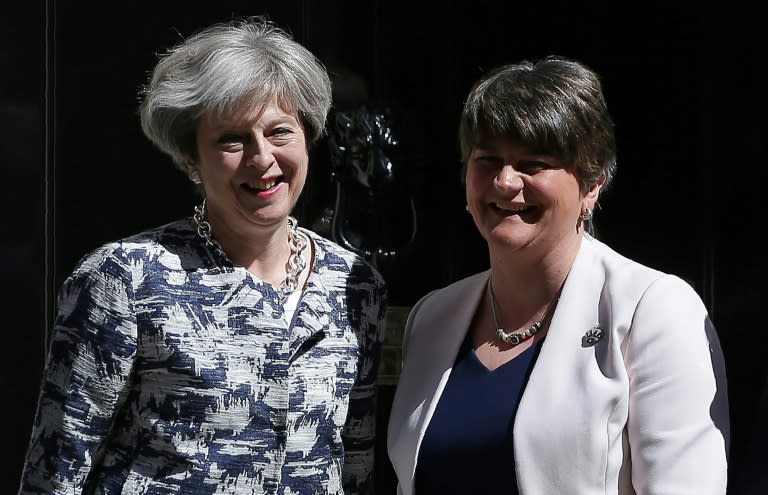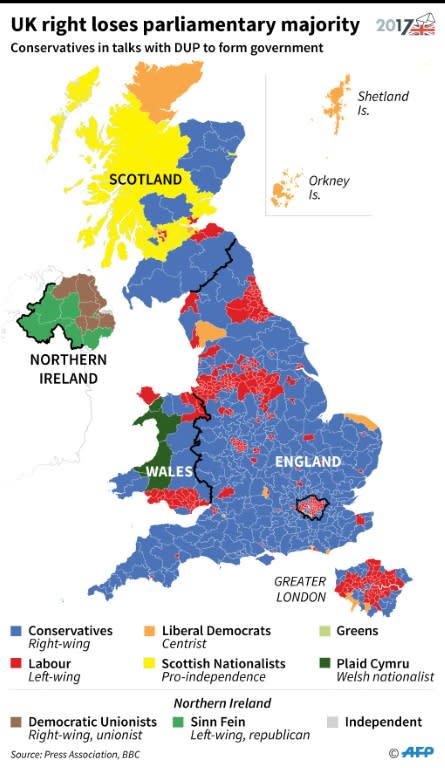PM Theresa May pays out for N. Ireland deal to govern Britain
British Prime Minister Theresa May's Conservatives struck a hotly contested pact with a Christian fundamentalist party on Monday that will allow her party to govern after they suffered an electoral disaster. The deal reached with Northern Ireland's Democratic Unionist Party (DUP) was slammed by opposition parties as political bribery, amid concerns about its impact on the province's delicate peace process. It comes after May lost her parliamentary majority in the general election on June 8, which she had called to boost her support ahead of Brexit talks on Britain's divorce from the European Union. "I welcome this agreement which will enable us to work together in the interests of the whole United Kingdom," May said in a statement. Under the terms of the agreement, Northern Ireland will receive an extra £1.0 billion (1.1 billion euros, $1.3 billion) from the state over two years. The DUP said it would back the government in any confidence votes and to pass budgets, as well as supporting it on Brexit-related legislation. For any other parliamentary votes, the DUP -- which has 10 MPs -- said its support would be given on a case-by-case basis. - 'Not in national interest - The pact's first test in parliament will come with a post-election confidence vote expected on Thursday. There was consternation from the opposition at the alliance, which has also attracted concern from some Conservatives over the DUP's hardline stance on social issues. "This Tory-DUP deal has not been done in the national interest but in the interest of @Theresa_May and the @Conservatives' own political survival," Labour party leader Jeremy Corbyn tweeted. Gerry Adams, leader of the republican party Sinn Fein in Northern Ireland, said the deal "provides a blank cheque for a Tory Brexit which threatens the Good Friday Agreement". That agreement in 1998 helped end decades of bloodshed between Northern Ireland's Protestant and Catholic communities. Cooperation between Britain and EU member Ireland lies at its heart. On Twitter, Scottish leader Nicola Sturgeon said "any sense of fairness sacrificed on the altar of grubby DUP deal to let PM cling to power". The DUP supported Brexit but has emphasised the need to keep the border with the Irish republic open, and its leader Arlene Foster said the deal would back a Brexit process "that supports all parts of the United Kingdom". - 'Hell of a mess' - The DUP was founded by the late Protestant firebrand Ian Paisley, who for decades brooked no compromise with Northern Ireland's Catholic minority before entering into an unlikely power-sharing deal with Sinn Fein. The DUP opposes gay marriage and abortion. Some representatives have been criticised for homophobic comments and for denying climate change. There is particular concern over the peace process. London's neutrality is key to the fragile balance in Northern Ireland. Irish Foreign Minister Simon Coveney was in Belfast Monday as part of negotiations aimed at restoring a power-sharing alliance between the DUP and Sinn Fein nearly four months after local elections in Northern Ireland. If the parties cannot come to an agreement by Thursday, Northern Ireland may be returned to direct rule from London. Coveney said May's deal with the DUP was a matter for those parties, but stressed that a restored local government was Northern Ireland's best bet to ensure its "unique circumstances" are recognised at Westminster. The Conservatives have 317 seats in the 650-seat parliament after the June 8 election and need the support of the DUP's 10 MPs to be able to govern. Foster said: "This agreement will operate to deliver a stable government in the United Kingdom's national interest at this vital time." She said the extra money would be spent on infrastructure, health and education, benefitting the whole of Northern Ireland, after concerns voiced by Sinn Fein. Discussions on a deal between the Conservatives and the DUP began immediately after the election, stirring up further resentment against the embattled May who was left weakened by the political setback. Conservative grandee Chris Patten described events leading up to the power-sharing deal, including last year's Brexit referendum called by May's predecessor David Cameron, as "the most damaging thing that's happened politically during my lifetime". "It sees us now in a situation where thanks to the pretty calamitous decisions of two Conservative prime ministers, we're in one hell of a mess," he told reporters.




